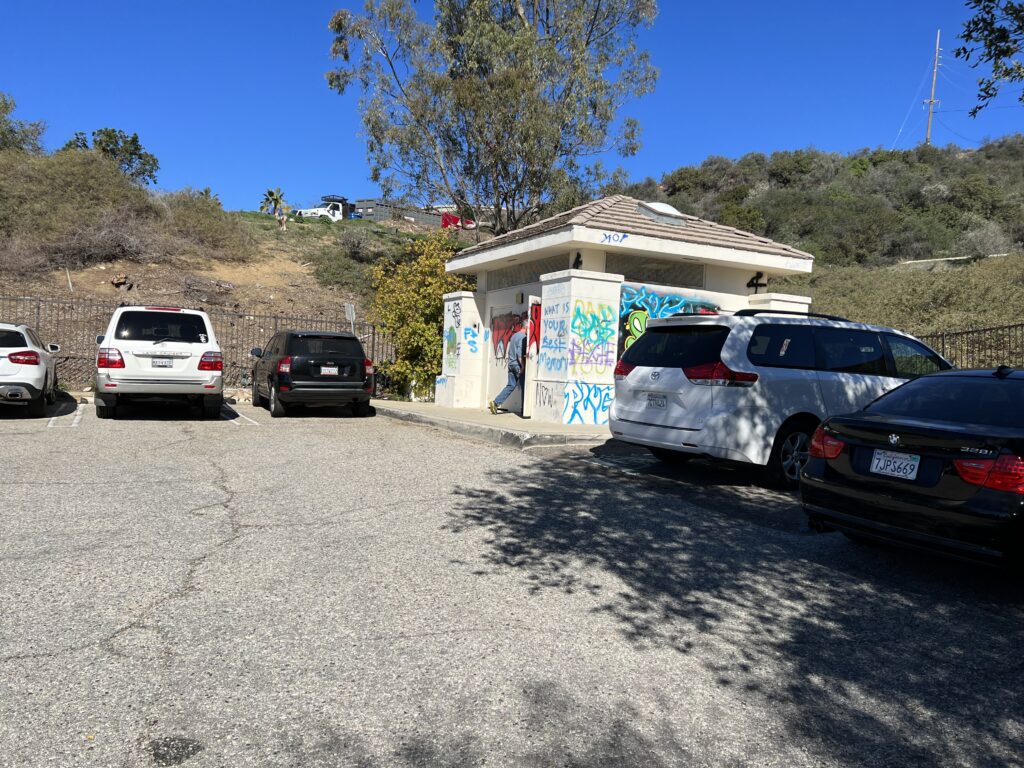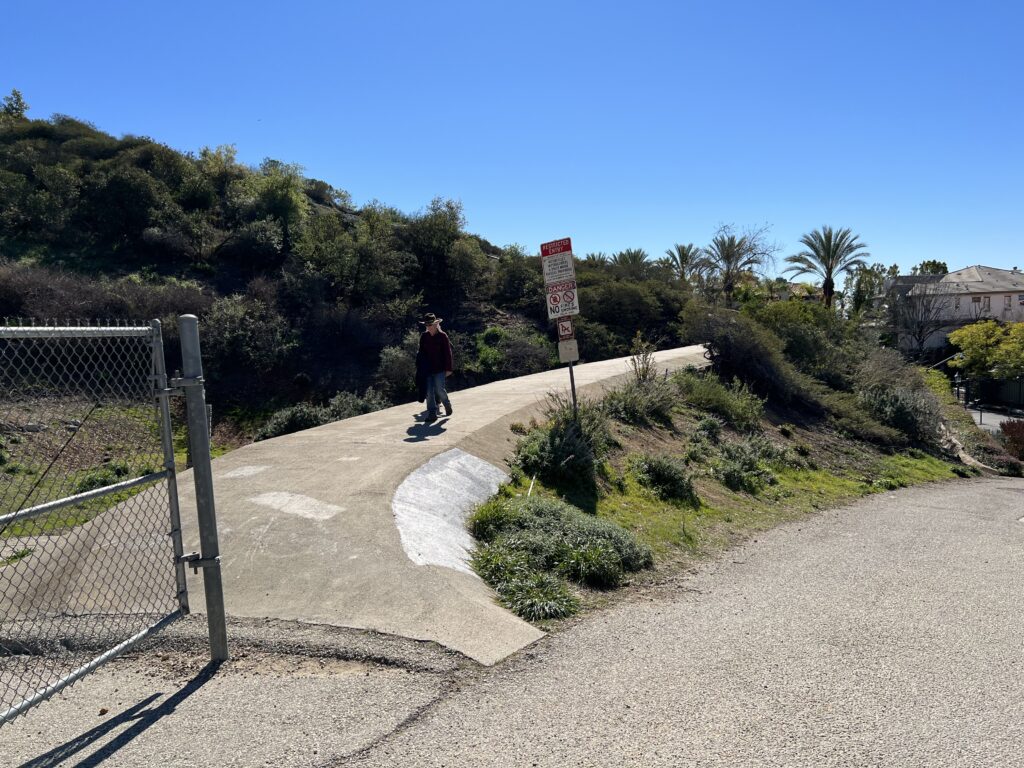
(Editor’s note: We received a note from hikers who said the Split Rock Trailhead’s bathrooms were disgusting. The trailhead is a major starting place for hikers using the Temescal Ridge Trail, Skull Rock and Topanga State Park. There is a parking lot for 10 cars along with a restroom building. CTN went to Highlands on Sunday and found the area in deplorable condition. This editor asked a hiker, who lives in the Highlands, who was responsible for keeping the area clean. He said that it was the Homeowner’s Association. News Reporter Sarah Stockman did a 2016 story “Keeping the Trail Open for Public: Highlands Lot Improperly Auctioned.” We’re reprinting it here, because it appears that nothing has changed. CTN will follow up.)

This bathroom building, with two bathrooms, is located in a parking lot. One side is locked, the other disgusting.
The potential sale and development of property containing 12 parking spaces and a restroom facility in the Palisades Highlands has been stopped, thus protecting public access to the Temescal Ridge Trailhead at the Split Rock Trailhead. But three government agencies, a developer and the property’s owner are now trying to solve a complicated ownership mess.
The City of Los Angeles, the County of Los Angeles, and the Coastal Commission are waging an inter-agency blame game along with Headland Properties Associates and the current property owner (1205-1207 Wooster Street LLC) as they all try to resolve how to get the now private land back into public hands.
The Coastal Commission believes that the fault lies with Headland Properties, since the company–the original developer of the Highlands–never fulfilled its obligation to deed the property (located at 16701 Via La Costa) to the Department of Recreation and Parks or another nonprofit.
“The ultimate goal here is the ensure that the… developer complies with the conditions of the permit. And the conditions of that permit require that this trailhead facility be transferred to a public agency that the commission staff approves,” Coastal Commission Southern California Supervisor Andrew Willis told the Palisades News.
However, the issue is proving complicated to resolve since the property has gone through so many agencies and hands.
Headland built the parking lot and restrooms on the property in the 1990s as part of a 1983 agreement with the Coastal Commission that allowed them to build The Summit in the Highlands. It was classified as a piece of privately owned land, despite the Coastal Commission limitations.
Due to its private ownership, property taxes were required to be paid. However, Headland never paid them.
“[Property taxes] should never be paid on those properties because they’re public,” said Ed Miller, CEO of Cal-Coast Homes, which is the current incarnation of Headland Properties.
The original deal between the Coastal Commission and Headland said that Headland could deed the property to the City of Los Angeles or to a nonprofit, although no agency was required to take it.
Headland deeded the property to the Department of Recreation and Parks in 2003. The department did not accept the deed due to budget cuts, but Miller says the city never informed Headland of its decision.
“We never knew it wasn’t recorded… until it went to auction and the first buyer bought it [and] came to us,” Miller said. “I was shocked.”
Headland could have also deeded the property to a nonprofit to be approved by the Coastal Commission, but the company never tried.
“No nonprofits are going to take it because it’s a maintenance issue,” Miller said.
And so the property remained in Headland’s hands, although supposedly unbeknownst to them. Property taxes accumulated over the years, which brought the property to the attention of the Los Angeles County Treasurer and Tax Collector.
“Pursuant to the California Revenue and Taxation Code, this property first became subject to the Tax Collector’s Power to Sell on July 1, 2005,” Assistant Treasurer and Tax Collector Kathy Gloster said.
However, the property did not go to auction until 2013 after amassing $16,885.35 in back taxes over 14 years, according to public record.
The Department of Treasurer and Tax Collector is required by law to auction a property after four years. Gloster says this property was ready for auction many times between 2005 and 2013 but was never auctioned.
“Ownership of the property was unclear and the property was pulled from various auctions,” Gloster said. “By 2013, staff made the determination that the property was in private ownership and sold the property at auction.”
The Coastal Commission believes that the property should not have been auctioned.
“If you were to look into the background of this property you would see that it was a coastal development property. There’s a quite extensive history record for this property,” Coastal’s Willis said.
He also noted that anyone who visited the property would see that it was occupied by a parking lot and restroom building and not a single-family home.
Gloster believes the sale of the property was legal, although the Los Angeles County Assessor at the time was John Noguez, who was arrested during his term on suspicion of corruption and is currently awaiting trial.
“Although there was some indication that there was a trailhead on the property, the [Treasurer and Tax Collector] relies on title reports to locate parties of interest,” Gloster said. “The title report pulled in 2013 did not indicate that the property was connected to the Coastal Commission.”
The auction of the property cannot be reversed because more than a year has passed since the property was auctioned and sold for $350,000.
“In Section 3725 of the [California Revenue and Taxation] Code, the statue of limitations for petitioning the Board of Supervisors to rescind the sale is one year from the date of the execution of the Tax Deed,” Gloster said. “However, this does not preclude the parties from working independently to resolve the matter.”
The issue now is how to get the property back into public hands.
Ben Kalaf is one of three owners of the property and a property developer himself. He believes that in order for the issue to resolved, someone or some agency must come forward and admit they erred.
“Our attorney talked with [Coastal Commission Enforcement Officer] Jordan Sanchez and he said in a very mild way that somebody dropped the ball,” Kalaf said. “People make mistakes all the time. In this kind of a case, I would love to see somebody come and say, ‘This is a mistake, [we] apologize for that, here is your money.’”
Kalaf’s vision of how things might proceed does not appear to be happening.
The L.A. County Treasurer and Tax Collector’s office has wiped its hands of the situation, despite receiving a strongly worded letter from the Coastal Commission on August 5.
“We have been in contact with the Coastal Commission regarding the particulars of the matter. Our review of the sale file indicates that the sale was legal,” Gloster said.
Sheila Kuehl, the Los Angeles County Supervisor for District 3, is not interested in pointing fingers and believes that the issue falls under the jurisdiction of the City, not the County.
“I’m very happy that the public will continue to have access to the trail. That’s what’s most important,” Kuehl said.
This leaves the issue to be dealt with by Councilman Mike Bonin’s office, Headland, the current owners and the Coastal Commission.
David Graham-Caso, Bonin’s communications director, believes that a solution can be found, but the how and by whom is up in the air.
“[The] ideal scenario for everyone involved is an open trailhead with maintained and accessible trailheads that allows the community to enjoy a beloved hiking trail,” Graham-Caso said. “The how [and] who is what we’re working on.”
Former owner Ed Miller (of Cal-Coast Homes) believes that he’s done the best he can for the property.
“Now I don’t own it any more… there’s nothing I can do,” Miller said. “We’ve done everything we could possibly do. Until the city wants to take it, we can’t do anything with it.”
The Coastal Commission disagrees with Miller.
“What’s clear is that there’s an obligation of the developer to transfer the property to a public agency to maintain this property,” Southern California Supervisor Willis said.
Despite the length of time that has passed and the fact that Headland no longer owns the property, they are still required to adhere to the original agreement between them and the Coastal Commission.
“We’ve notified Headland… of the noncompliance of the obligations,” Willis said.
What will happen next is anybody’s guess. For now, the property remains open to hikers, although only one bathroom is unlocked and the area is not being maintained.
One search on the Internet showed the property as having a 256-sq.-ft. single-family residence on 0.46 acres. (Someone deemed the public bathroom a home.) But, on every map on the Internet with the 16701 Via La Costa address, the property is clearly labeled as the Temescal trailhead.
If an estate were to be built on the half-acre property, it would effectively eliminate public access to the trail, which offers spectacular ocean views and links to trails near Skull Rock in Temescal Canyon.

The trailhead is across from the parking lot and winds its way above the Highlands.

And this “sewer” is just now being noticed by the many hikers who use the trailhead? Seems like a few of them could arrange to get together for an hour (masked and gloved) and exercise their muscles that way?